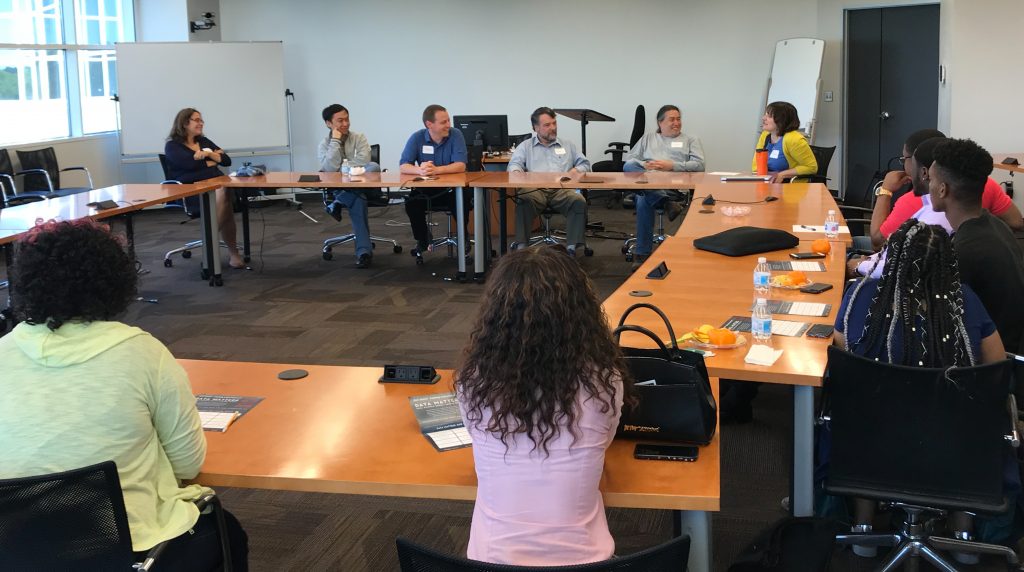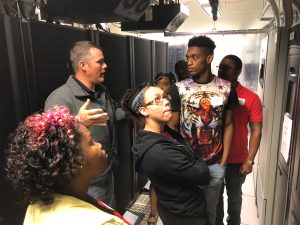A group of undergraduate Winston-Salem State University (WSSU) students majoring in math recently visited Chapel Hill for an educational tour of RENCI and to make connections with peers and educators in the UNC-Chapel Hill math department.
John Hutchens and Felicia Griffin, assistant professors in the mathematics department at WSSU, arranged the visit as part of a series for their students to highlight the types of jobs available to math and computer science graduates.
According to Hutchens, understanding career paths available to math majors can be daunting for undergraduate students.
“When I was an undergraduate, I had no idea of all the possible careers available to someone with a mathematics degree,” he said. “Setting up these experiences allows students to see first-hand possible ways to continue their career and to meet people other than their professors that chose to pursue careers in computational sciences.”

Panelists (left to right) Claris Castillo, Hao Xu, Terrell Russell, Erik Scott, Chris Bizon, and moderator Sarah Davis chat with students from WSSU about potential future careers.
The visiting students, who specialize in a variety of disciplines, including applied mathematics, software developers, data scientists, and computer engineers at RENCI. A RENCI panel of experts shared and responded to questions covering everything from the kinds of projects researchers at RENCI work on to the classes that will best prepare them for jobs in STEM fields.
Chris Bizon, RENCI’s acting director of analytics and data science, said that while statistics courses always provide solid skill development, students can learn best through hands-on experience.
“The way you really learn a programming language is that you just do it; you solve a real problem,” he said. “It doesn’t have to be for a class. Your own project offers quality experience also.”
Panelists also agreed that science and math classes are not the only foundational courses for a successful career in STEM fields. “I would be sure to take a technical writing class,” recommended Terrell Russell, chief technologist for the iRODS Consortium. “If you can’t communicate what you’re doing to other people, it doesn’t matter.”
RENCI Research Scientist Hao Xu suggested students consider adding at least one philosophy class. “Certain classes teach you a way of thinking that helps you differentiate similar concepts. This translates very well in science and math fields,” said Xu.
Claris Castillo, assistant director of DevOps and cloud strategist, also encouraged students to step outside of the classroom and strike up cross-departmental partnerships. Since computer science departments often do not have students with hard math backgrounds, there is room for both groups to learn much from each other. Erik Scott, senior research software developer, echoed this sentiment and pointed out that part of his job is reaching out to universities across the state to create research partnerships. A key takeaway for the student visitors was that collaboration is key to quality research.
Sarah Davis, RENCI project manager and one of the coordinators of the National Consortium for Data Science (NCDS), moderated the panel discussion. The NCDS connected the WSSU group to RENCI, planned events for the day, and provided food and beverages for the students.
During a tour of the RENCI data center, Linux Administrator Chris Rutledge explained the various duties and tasks performed by the data center staff, such as running computational analyses of coastal storm surge and computing for genomic sequencing.
The day-long experience continued with a visit to the UNC-Chapel Hill math department where the students met with Roberto Camassa, Kenan professor of mathematics, Richard McLaughlin, chair of the department of mathematics, and graduate students who study experimental fluid dynamics. The group demonstrated their wave tank and experiments related to fluid densities.
Hans Christianson and Jeremy Marzuola, associate professors in the math department, closed out the day for the students by leading a panel discussion about what to expect as a graduate school in mathematics.
– Stephanie Suber
